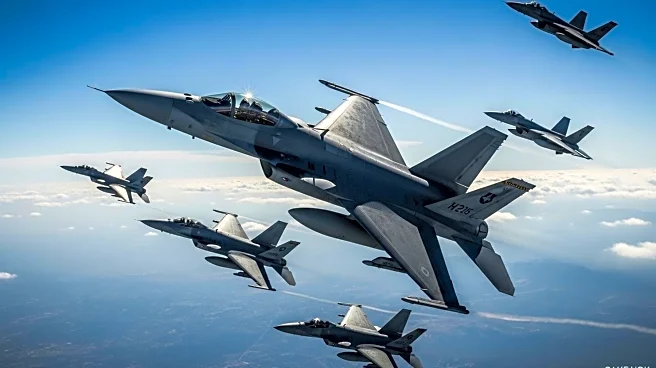What is the story about?
What's Happening?
On September 20, NATO jets, including Polish aircraft, were scrambled in response to a massive drone and missile attack by Russia on Ukraine. This operation followed recent Russian incursions into Estonian airspace and drone activities in Poland and Romania. The Polish military reported heightened readiness of air defense systems. The Russian attack on Ukraine involved 579 drones, 32 cruise missiles, and 8 ballistic missiles, targeting infrastructure and civilian areas, resulting in casualties. Ukrainian President Volodymyr Zelenskyy called for NATO collaboration on air defenses. NATO has initiated 'Eastern Sentry,' deploying military hardware to its eastern flank but has not agreed to an air defense umbrella over Ukraine.
Why It's Important?
The escalation of Russian military actions in Ukraine and airspace violations in NATO countries heightens tensions in Eastern Europe. This situation underscores the vulnerability of NATO's eastern members and the potential for broader conflict. The attacks on Ukraine's infrastructure and civilian areas highlight the ongoing humanitarian crisis. NATO's response, including the deployment of additional military resources, reflects the alliance's commitment to regional security. However, the reluctance to extend air defenses into Ukraine indicates strategic caution. The situation impacts geopolitical stability, with potential consequences for international relations and defense policies.
What's Next?
NATO's continued military readiness and deployment of resources to its eastern flank suggest ongoing vigilance against further Russian aggression. Diplomatic efforts may intensify to address airspace violations and support Ukraine. The alliance's strategic decisions regarding air defense collaboration with Ukraine remain pivotal. Potential reactions from Russia, including further military actions or diplomatic maneuvers, could influence the regional security landscape. The humanitarian impact in Ukraine may prompt increased international aid and support.
Beyond the Headlines
The situation raises ethical questions about the protection of civilian lives and infrastructure in conflict zones. The targeted attacks on oil facilities by Ukraine highlight the strategic importance of energy resources in warfare. The broader implications for international law and norms regarding airspace violations and military aggression are significant. Long-term shifts in defense strategies and alliances may emerge as countries reassess their security policies in response to Russian actions.















